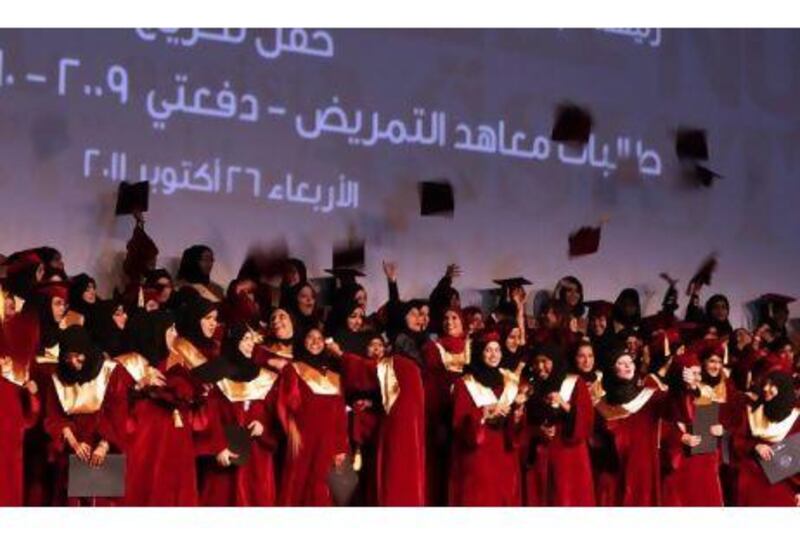DUBAI // Nursing students emphasised the importance of having more Emiratis in health care during a ceremony last week that saw 200 graduates receive diplomas.
The ceremony was held last week at the World Trade Centre under the patronage of Princess Haya, the wife of Sheikh Mohammed bin Rashid, Vice President of the UAE and Ruler of Dubai.
Fifty-nine Emiratis were among those who came from the nursing institutes in Fujairah, Ras Al Khaimah and Sharjah. Graduates and instructors said the number of Emiratis proved strong in a country where they make up such a small portion of healthcare professionals.
A study last year by the Ministry of Health showed that less than 4 per cent of nurses in the country are Emirati. However, graduates were optimistic that this number would change.
"I hope that one day Emiratis will make up a majority of all nurses in the country," said Haleema Sultan, an Emirati graduate from the Ras Al Khaimah Institute of Nursing. "If a local patient sees a local nurse, they feel much more comfortable. Only we can truly understand their concerns."
Misconceptions about nursing had prevented nationals from joining the field, graduates said. However, these negative perceptions are slowly changing.
"Nurses were once looked at as housemaids," Ms Sultan, 22, said. "But now, they can have a better reputation than doctors."
Mohammed Al Shami, a lecturer at the Fujairah institute, attributed such misconceptions to "old images" of nursing that made the field unattractive for men and women.
"It is seen as not a complete profession, but a constantly developing one," he said. "This public image is influencing student choice of enrolling in the programme."
However, Dr Al Shami said, having more Emiratis in nursing, and in the healthcare industry in general, is vital for the country's progress.
"National nurses from the community can better grasp the needs of a patient, especially in a cultural aspect," he said. "In addition, nationals must join this international campaign so that they are not left behind."
Dr Mohammed Bani Younis, a clinical coordinator at the Ras Al Khaimah institute, said there was a particular need for local nurses in public hospitals.
"Most of the nurses that come from outside, especially from Asia, only use the UAE as a transitional phase. They eventually go work outside in other countries," he said. "This is why we really need national students to help us cover this shortage."
The students said they were up for the challenge. Maha Abdullah Al Nagbi, 24, a graduate of the Ras Al Khaimah institute, described her pledge to join nursing as a "service to her people".
"Local patients should have a member of their national family servicing them, not foreigners," she said.
She hopes to work at Saif bin Ghubash Hospital in Ras Al Khaimah.
Hessa Al Shehhi, 22, from Ras Al Khaimah, also has a passion for helping others.
"I took this opportunity so that I can connect to my fellow Emiratis who need our support," she said. "I believe that having a local nurse is a patient's right."





